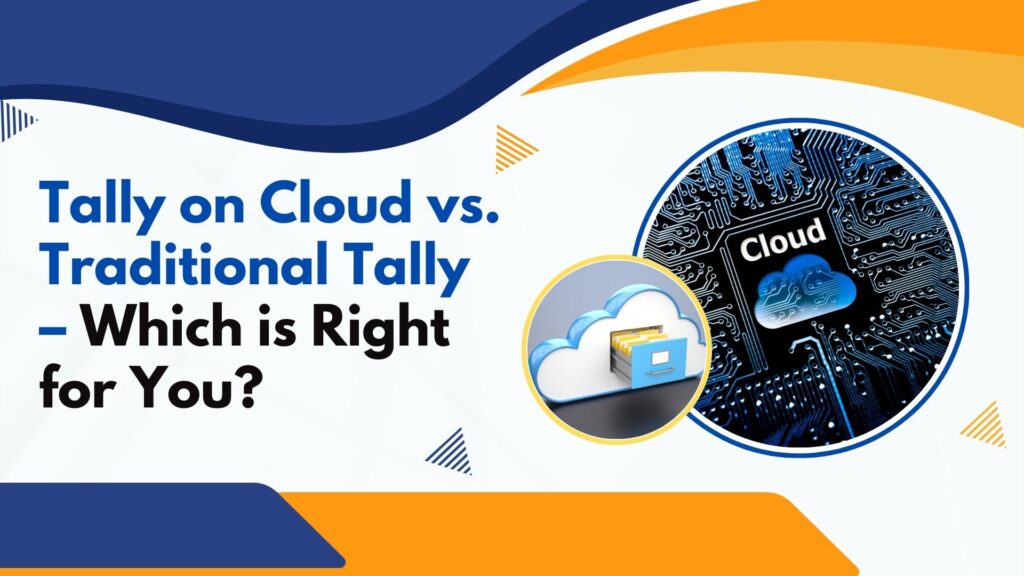If your business runs on Tally, you already know its importance for managing accounts, inventory, and compliance. But here’s the big question for 2025: Do you stick with Traditional Tally or move to Tally on Cloud?
The decision comes down to performance, security, cost, and flexibility. Let’s break it down.
Traditional Tally – The Old Reliable
Traditional (on-premise) Tally has been a trusted companion for years. You install it on local systems, and it works well—if your team works from the office and you have the right IT infrastructure.
Pros:
- One-time purchase cost.
- Works without internet for single-user access.
- No dependency on third-party hosting.
Cons:
- Office-bound—no remote access.
- Needs regular IT maintenance and hardware upgrades.
- Vulnerable to local hardware failures and data loss.
- Collaboration between multiple users is clunky.
Tally on Cloud – The Modern Upgrade
With Tally on Cloud, your accounting software is hosted on secure cloud servers, allowing you to log in from anywhere—whether you’re in the office, at home, or on the go.
Pros:
- Work from anywhere with just an internet connection.
- Automatic updates and backups—no IT headaches.
- Better Tally cloud pricing through flexible subscription plans.
- Multi-user access with real-time collaboration.
- Strong data encryption and disaster recovery.
Cons:
- Requires a stable internet connection.
- Ongoing subscription fees.
The Performance Difference
| Feature | Traditional Tally | Tally on Cloud |
| Remote Access | No | Yes |
| Scalability | Limited | Easy to scale |
| Data Security | Dependent on local setup | Enterprise-grade |
| Multi-User Collaboration | Complicated | Seamless |
| Hardware Maintenance | Required | Not required |
Why Businesses in 2025 Are Choosing TallyCloud
TallyCloud.net takes the benefits of Tally on Cloud and adds:
- Ultra-fast servers for zero lag.
- Affordable Tally cloud pricing tailored for SMEs.
- Dedicated 24/7 support.
- Simple migration from Traditional Tally—no downtime.
Final Verdict
If you’re a single-user business with no need for remote access, Traditional Tally can still work for you. But for most modern businesses—especially those embracing hybrid or remote work— Cloud Tally is the clear winner.
And with TallyCloud, you get all the advantages of the cloud without the headaches of managing servers yourself.
Tally Cloud VPS (Virtual Private Server) and tally shared cloud are two different types of hosting services.
Tally Shared hosting is a type of hosting where multiple multiple tally are hosted on the same server. This means that all tally share the same server resources, such as CPU, RAM, and disk space. Tally Shared hosting is often the cheapest option and is not suitable for host Tally .
Tally Cloud VPS , on the other hand, is a type of hosting where multiple virtual servers are created on a single physical server. Each virtual server acts as a dedicated server with its own resources, such as CPU, RAM, and disk space. Tally Cloud VPS hosting is more expensive than shared hosting but offers more control, flexibility, and scalability.
Resource allocation:
With shared hosting, resources are shared among all tally hosted on the server, which can cause performance issues if one Tally consumes too many resources. With Cloud VPS, each virtual server has its own dedicated resources, so performance issues are less likely to occur.
Scalability:
Tally Cloud VPS is more scalable than shared hosting because it allows you to easily upgrade or downgrade your resources as needed.
Control:
Tally Cloud VPS provides more control than shared hosting. With Cloud VPS, you have full root access to your virtual server and can install any software you need. With shared hosting, you have limited control over the server configuration.
Security:
Tally Cloud VPS hosting is generally more secure than Telly shared hosting because each virtual server is isolated from other virtual servers on the same physical server. This means that if one Tally is compromised, it won’t affect other Tally hosted on the same server.
In 2025, accounting belongs in the cloud—and your business belongs on TallyCloud.net.

